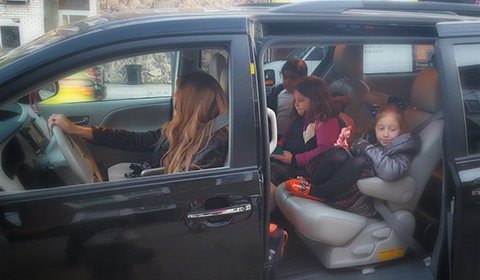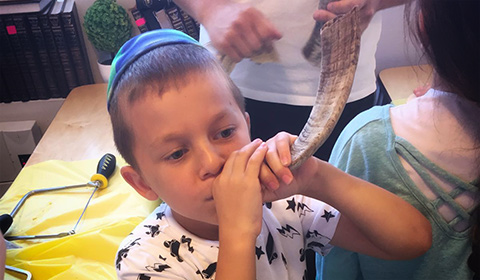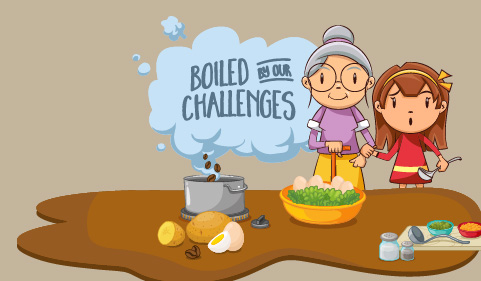Menachem Hojda works as a social worker in his community. As a teenager, Menachem experienced the divorce of his parents, which has influenced his outlook on life in many ways.
Can you tell us a little about yourself?
My name is Menachem Hojda, I am boruch hashem married, and have two wonderful children. Today, I work in my community as a social worker, a clinical therapist and serve on the local school board for my district in Oak Park, Michigan just outside of Detroit.
Can you tell us about your experience?
The whole thing started the summer before my bar mitzva, when my parents decided to get divorced. The year of my bar mitzvah was occupied with the process of the divorce. I was handling the separation and divorce, and getting used to the idea of living in two different places. For my high school years, I went out of town for yeshiva. Since I was not home right after the divorce, my experience was different from my siblings who were there at home after my parents divorced. I followed things from afar during those years. My high school years were very difficult for me because my family was going through an extremely difficult situation, but I think that the experience helped me grow and develop qualities that I might not have otherwise developed.
The entire process was very chaotic. This is one of those things that people who have not gone through divorce think they understand about divorce. However, unless they themselves have gone through the divorce, it is very hard to understand what that is like. If you think about it from the perspective of a child that is going through the divorce, all of a sudden your whole life does not make sense anymore, nothing is predictable… nothing is stable. Even today, as an adult, I am very sensitive to this; I will rarely plan too far into the future.
You mentioned that you felt like you grew from the experience. Can you describe how?
Shortly after the divorce, my father remarried and I was struggling with certain aspects involved, like calling my stepmother “mommy”. A rabbi explained it to me as something everyone struggles with when they get married. He said, “you are dealing with this now when you are 14, when others only deal with it later on when they are more mature.” This is a small example of the many things that those of us from single-parent families deal with at an earlier stage than many others. Another aspect is that our parents are also dealing with something hard and may be preoccupied with their own pain. They may not even realize how distracted and unavailable they are at a time when we need them so much. We are also preoccupied with trying to keep track of so many things. That chaos is twofold, the world does not make sense anymore, and the people we need to help us make sense of our world are not available for us because they are in so much pain themselves.
How did you cope with the “well-meaning” advice from others?
A lot of people wanted to be helpful and meant well; however, they would say and do things that ended up being very hurtful. People assumed they knew things about my family because of the Lashon Harah that was going around. I was only 14, and had advice coming from all directions.
Many times, we are in pain, and it is easy to be rude to people who mean well. However, it is important to stay calm, so others do not misunderstand our reactions. We can smile, say thank you, and move on. When a person experiences pain, the logical part of the brain shuts down, and the reactive part of the brain reacts. Therefore, it is easier to get angry, upset, or lose patience; however, it is important to reactivate the logical part of the brain. For boys, they may want to find something they enjoy learning, and find someone to learn with on a regular basis.
I went through several bouts of depression. I did not understand it at that time, but when a person is depressed, it is extremely difficult to do simple things. My mother was incredible, she never gave up. She encouraged me and gave me the space to figure out what I had to do.
Do you have a message to impart to children from single parent homes?
My message to children growing up in single parent homes is, it is important to understand that our parents and the adults in our lives are also going through really tough times, and right now, they may not be able to be there for us, but things will pass and it will get better. When people are going through rough times, they say and do things they would not do otherwise. It does not mean they do not love or care about you. I think that is the most important thing I had to come to terms with, because it is devastating when we come to our parents and they do not seem to listen. Try to make sure you have someone on the outside whom you can talk to and is available to listen to you rather than give advice, whether it be a friend, neighbor, or teacher.
Another thing is to find something that brings you menuchas hanefesh. For some people it is mindfulness, for some it is deep relaxing breathing, and for others it is playing sports or doing exercise. For me, I used to go to a place where I could be alone with myself and tune out. When we get through this incredibly difficult time, we come out stronger.
What motivated you to enter the field of social work?
During my high school years, it became apparent to me that there was a disconnect between the wonderful Chesed in the frum community and the sophisticated professional understanding of the dynamics involved in divorce. Things that are helpful in other contexts may be very unhelpful for divorced families. For example, people might advise children from divorced homes not to get involved… to ignore what is going on… not to pay attention…. If a child is not given context they have to provide all the information on their own to fill in the gaps. I wanted to connect the well-meaning chesed-oriented people in the community and the professional understanding that exists.
When I was growing up, I used to wish I could be part of different families in my community. However, when I became a social worker in my community and heard about what other families were going through, I realized that every family has struggles. Some are on the surface so everyone knows about them, and others have family secrets that are hidden. Although I had to deal with hardships, I cannot imagine having to deal with the challenges the other families are going through. It is so true that Hashem only gives us the challenges that we have the tools to handle.
Thank you Menachem. It is great to hear from someone who has been through the challenge of divorce and come out stronger.






